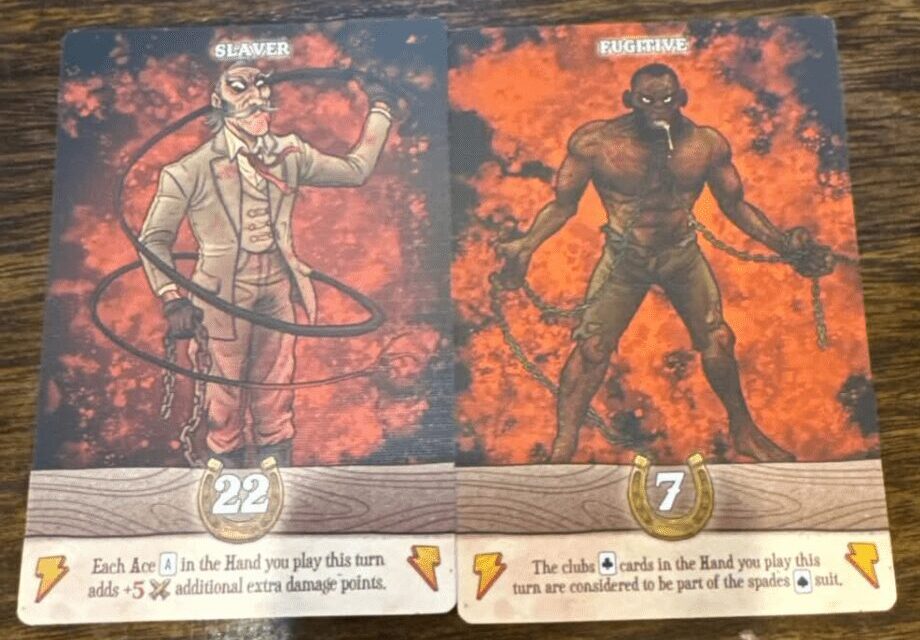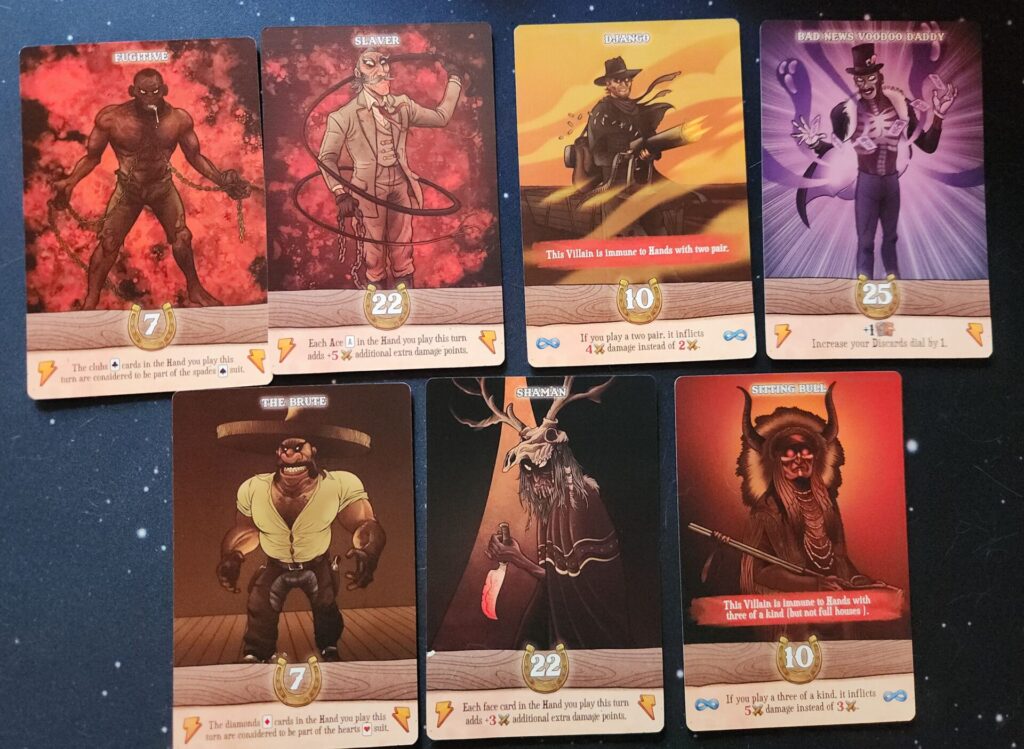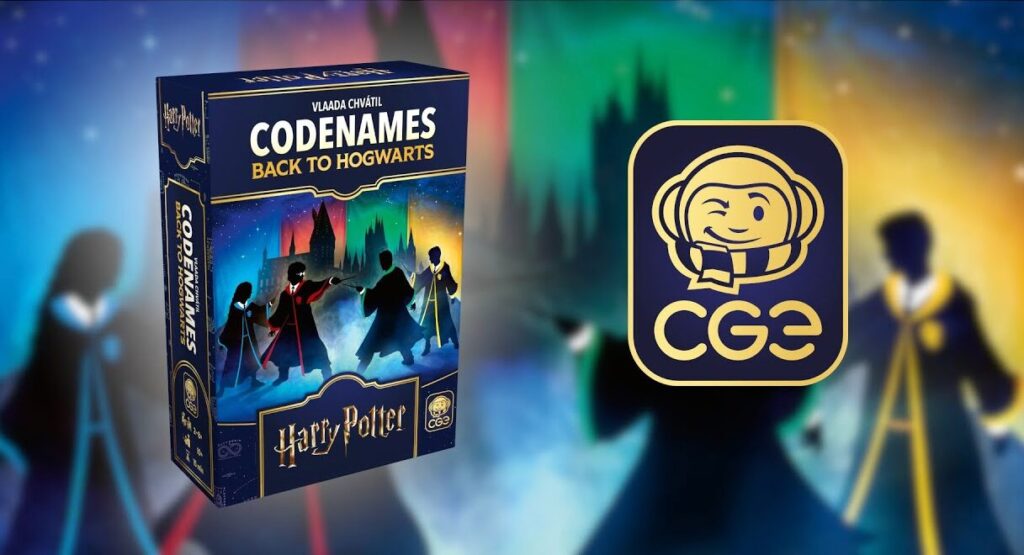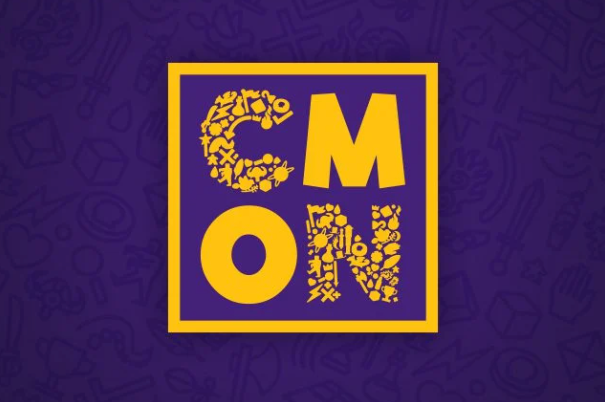
Devir to recall all copies of new release Ace of Spades after backlash over slavery depictions in artwork, apologises for causing harm
Devir Games has halted sales of its new release Ace of Spades after being called out for using racist and culturally insensitive artwork in the game, calling it “a serious mistake that we recognize and deeply regret”.
The publisher said it would recall all copies of the game sent to retailers and would review and replace any cards in the game “that may be hurtful or offensive”, with replacements made available free of charge to anyone who requests them.
The swift response from Devir came less than 24 hours after it began coming under fire online over some of the game’s artwork – most notably the ‘fugitive’ card, which depicts a half-naked black man in chains apparently drooling or foaming at the mouth.
Devir’s decision to include a ‘slaver’ card was also called into question, as was artist David Rubin’s portrayal of indigenous people in the US, including showing respected leader Sitting Bull with glowing red eyes and horns.
Jeremy Howard, a long-time contributor to popular board game review channel Man vs Meeple, was among the first to draw attention to the game’s artwork via his BoardGameGeek post yesterday, titled ‘Just some Ole Racist “history crap”‘

He said in the post, “First I am not a race baiter or need attention. I’m a black man that recognizes history can be betrayed in educational form.
“This is not that, this is just in the name of fun. I also respect if you and I don’t agree. I’m not sensitive…this is just BS, it’s not just an oversight.
“Literally a black man in chains DROOLING. I will not be covering Devir Games or any by the artist. Jesus.”
A statement from Mik, Starla and Grant Fitch from Our Family Plays Games – among the highest-profile Black voices within the board game hobby – released prior to Devir’s apology called the depictions “disturbing and disappointing, especially given the ongoing work within both American society and the tabletop hobby to combat harmful stereotypes, discrimination, and racism”.
It continued, “These portrayals undermine the efforts of BIPOC designers, content creators, and publishers who are striving to foster greater representation, diversity, and equity in the gaming community.
“…It’s disheartening that no one involved in the production of this game recognized the offense these depictions might cause – particularly to the Black community and communities of color more broadly. We strongly encourage you to consult with experts in diversity and inclusion moving forward, especially when depicting people of color in your products.”
When BoardGameWire asked Devir if the company agreed with the characterisation of the fugitive artwork as racist, a spokesperson for the company said, “We didn’t realize it was at the time of publication, but now we understand that it is and deeply regret using it.
“What we tried to achieve here was to show a powerful man who managed to break the chains of slavery, and ended up falling under the influence of the evil adversary of the game. We obviously failed at pushing that concept.”
They said there was nothing different or fast-tracked about the development process for Ace of Spades, given that designer Benjamin Amorin is a senior member of staff at the company, but did not answer a question about whether there were any conversations or concerns raised during development about the appropriateness of the artwork.
Devir confirmed to BoardGameWire that the game’s artist, David Rubin, had been asked to rework “all the problematic cards”, and that “he is being super eager to help”, adding, “He is a professional who delivered the art that we asked for, so it is all on us.”
BoardGameWire also asked Devir why no cultural consultants were employed for the game, when the company hired two for the development of feudal Japan-themed game The White Castle.
The spokesperson said, “We did make a consultation on The White Castle, as we do with other games rooted in real world historical events. Ace of Spades is based in a fictional universe so it didn’t occur to us that it would be necessary.
“We have learned the hard way that we need to rely on professional advisory regardless of any other consideration.”
Devir committed as part of its apology to launch “a thorough review of our editorial and design processes to prevent anything like this from happening again”, adding that it would consult with experts in diversity, history, and cultural representation on its future projects.
A statement from the company said, “There’s a principle we hold on to in moments like this: never attribute to malice what can be explained by stupidity. It does not excuse the error, but it reminds us that harm can be done – and was done – without ill intent. That harm still matters, and it is our responsibility to face it fully.
“At Devir, we have made a serious mistake that we recognize and deeply regret. In our recent game Ace of Spades, we included two inappropriate illustrations: one depicting a black person in a state of enslavement, and another portraying an enslaver. Both were originally intended as visual references to scenes from the film Django Unchained, as part of the game’s homage to Western cinema.
“However, we now fully understand that this approach was misguided. Depicting imagery tied to the violence and trauma of slavery – even as a cultural reference – is not appropriate in a board game context. These illustrations trivialize a painful and deeply rooted historical reality. They should never have been included.
“We take full responsibility for the harm caused, and we offer our sincerest apology to everyone, without conditions or excuses.”
It added, “Our commitment is clear: to listen, to make it right, and to do better. We are learning from this mistake with humility, and we know that only through action can we begin to rebuild the trust we’ve broken. We are especially grateful to those who brought this issue to our attention with clarity and care. You’ve given us the opportunity to improve – and we will not waste it.”
Devir’s rapid apology and immediate decision to remove the artwork received a notably positive response across BoardGameGeek and social media, with the company being praised for its speed of action and willingness to admit fault.
That response stands in stark contrast to the heavy criticism which continues to be levelled at Codenames publisher Czech Games Edition, which is currently under boycott from some of board gaming’s biggest and most influential reviewers after deciding to release a new Harry Potter-themed version of the game, despite years of anti-trans campaigning from the character’s creator JK Rowling.
CGE has released two statements since unveiling the game on July 23, the first of which was roundly ridiculed for going out of its way to avoid mentioning Harry Potter or JK Rowling by name.

The company’s second statement, released eight days ago, acknowledged that the company’s decision had caused harm, but was criticised for its lack of detail about what the publisher plans to do to rectify the situation.
The statement said, “We’re grateful to everyone who engaged with us over the past few days and took the time to share their perspectives. At CGE, our aim was never to cause harm, and we acknowledge that, with our recent Codenames announcement, we have.
“We are working hard within our constraints to find the best way forward and we will update you as soon as we can. We understand that what we have done has caused distress, and are working towards a concrete solution with several members of the affected communities. Please bear with us as we figure this out.”
CGE is yet to provide any further details since that statement was released at the end of last month.
The Tabletop Game Designers Association, a professional organisation created last year by Wingspan designer Elizabeth Hargrave, Space Cadets creator Geoff Engelstein and Mind MGMT designer Sen-Foong Lim to advocate for designers in North America, called on all publishers to use cultural consulants in the wake of the Ace of Spades release.
It said, “While the industry as a whole has made progress in being more inclusive and sensitive in depictions of people, this demonstrates that there is still much work to be done.
“We urge all publishers to use cultural consultants to review artwork, language, and other aspects of games to help guard against these issues and protect against the blind spots that all of us have in certain areas.
“Also, generally, it is fraught when slavery and other serious issues are used as ‘window dressing’ or stereotypes. These issues are worthy of inclusion and exploration in games, but need to be engaged with in a thoughtful way for a reason, not just for period seasoning.
“TTGDA will also now strongly recommend that all contracts contain a clause that gives designers the right to review art prior to publication, and remove their name and likeness from a game if they have issues with the artwork, theme, or mechanics changes implemented by a publisher. This will be part of our standard review template going forward.
“As an industry we need to continue to strive to do better.”






Was it really necessary to put the incriminated illustrations in large format at the beginning of your article ? *sigh*
A fair question, I think! I thought quite hard about whether to, or if it was enough to put e.g. the front cover of the game, and have the offending images in the body of the article. But on balance, because this particular image is at the crux of the entire issue, I decided on the former.
Well, then I don’t want to be there when the issue is a picture of non-consensual sex, or antisemite representation, or torture, or …
(Non-critical) “information” is more important than readers feeling safe, ok.
Duly noted.
Well I will say that posting this article, I’ve gotten people to understand the crux of the issue immediately without even reading the article, so I’d say for getting the point across it certainly did it’s job
[…] A Devir Games leállította új játékának, az Ace of Spadesnek az értékesítését, miután felhívták a figyelmét arra, hogy a játékban rasszista és kulturálisan érzéketlen illusztrációkat használt.A kiadó kijelentette, hogy visszahívja az összes, a kiskereskedőknek elküldött példányt, felülvizsgálja és kicseréli a játékban azokat a kártyákat, „amelyek sértőek vagy megalázóak lehetnek”, és a cseredarabokat ingyenesen biztosítja mindenkinek, aki kéri.A Devir gyors reakciója kevesebb mint 24 órával azután következett be, hogy a játék néhány grafikája – elsősorban a „Fugitive” (szökevény) kártya, amely egy félmeztelen, láncra vert fekete férfit ábrázol, aki láthatóan nyáladzik vagy habzik a szája – heves online kritikát váltott ki. (BoardGameWire) […]